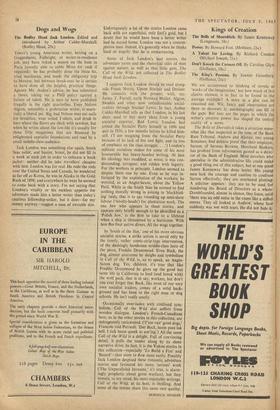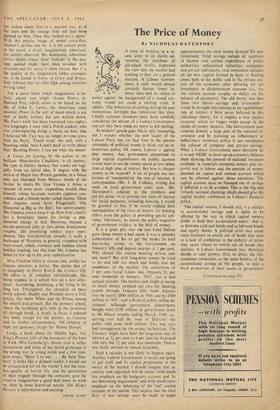Kings of Creation
The Bells of Shoreditch. By James Kennaway. (Longmans, 18s.) Power. By Howard Fast. (Methuen, 21s.) A Talent for Loving. By Richard Condon. (Michael Joseph, 21s.) Don't Knock the Corners Off. By Caroline Glyn. (Gollancz, 18s.) The King's Persons. By Joanne Greenberg. (Gollancz, 21s.) WE are accustomed to thinking of novels as `works of the imagination,' but how much of this elusive clement is in fact to be found in the average example? A story or a plot can be reasoned out. Wit, fancy and observation are there to decorate it; autobiography can fill in the gaps. But rare are the pages in which the writer's creative power has shaped the central reality of a scene.
The Bells of Shoreditch takes a situation some- what like that suspected at the time of the Bank Rate Tribunal. Andrew and Alistair, two young Scotsmen, find definite proof that their employer, Sarson, of Sarsons Browne, Merchant Bankers, has profited from information gained as a direc- tor of the Bank of England. Most novelists who specialise in the administrative life could make a good thing out of this subject, but at one point James Kennaway has done better. His young men lack the courage and caution to confront Sarson effectively; they are overheard plotting: A solicitor appears: they are to be sued foll slandering the Board of Directors as a whole.' Dumbfounded, almost in silence, they listen, until `there was an odd noise in the room like a stifled. sneeze. They all looked at Andrew, whose face suddenly was wet with tears. He did not hide it;
ut looked about him in a puzzled way. as if le tears and the strange little sob had been lanted on him. Then they looked aw.ly Vith this precise image Of moral cowardice, mdrew's decline sets in: it is the central point a the novel, a detail imaginatively conceived, ot merely observed. Mr. Kennaway sometimes /rites slackly (those three lookeds' in the pas- age quoted might have been avoided with evision) and his satire is often forced. But it is 'le quality of his imagination (other examples re to be found in Tunes of Glory and (louse- .0 • old Ghosts) that Sets him high among novelists vriting today.
For a novel from which imagination is en- tirely absent you might choose Power, by Howard Fast, which seems to be based on the Lie of John L. Lewis, the American trade unionist. Power is the sort of novel which is not well or badly written, but just written down. Mr. Fast's work' has been translated into eighty- two languages. I once told a Polish student, who was contemplating doing a thesis on him, that I believed Mr. Fast was no longer persona grata With the Party. Thank God,' she said, with a beaming smile, 'now I don't need to write about him.' Reading Power, I can see what she meant.
A Talent for Loving, by the author of the brilliant Manchurian Candidate, is all fantasy, the type of literary fantasy that works out logi- cally from an initial idea. It begins with the arrival of Major Guy Patten', gambler, in a Texas only just liberated from Mexico. South of the border he meets Dr. Jose Vicuna y Arias, a rancher of even more stupendous .wealth than himself, Whose hacienda includes eighteen con- Alibines and a female butler called Janine. These first chapters recall Scott Fitzgerald's `The Diamond as Big as the Ritz'; but unfortunately Mr. Condon cannot keep it up. Don Jose's family has a hereditary 'talent for. loving'--a phe- nomenal energy in bed. However, beyond a seaside-postcard joke or two about honeymoon couples, this promising subject stays unex- doited. This `non-historical comedy' is really a nburlesque Of Westerns in general, complete with train-wreck, rebels, cowboys and Indians. Good holiday reading, but this time Mr. Condon has 'ailed to live up to his own sophistication.
Miss Caroline Glyn is sixteen and, unlike her famous ancestor, a realist. She claims. that •all is imaginary in Don't Knock the Corners DM he effect is of complete verisimilitude, like wing trapped in a school bus on a hot after- soon: fascinating, deafening, a bit tiring in the long run. Throughout this chronicle of three awful schools. Daddy and Mummy move a little jerkily, like Snow White and the Prince among the dwarfs and animals. But the primary school, Where the terrorised girls hide in the lavatories all through break, is nicely in focus. I enjoyed this book, except for the poems: as Cocteau aid in similar eirtumstances, 'All children of eight arc geniuses, except for Minot, Drouet.'
Lastly, a book about the Middle Ages, The Ving's Persons, tells of the massacres of the Jews n York. Miss Greenberg's chosen style is rather nconsistent and some of her detail grotesque in he wrong way (a young monk and a Jew com- 'are notes: 'Show it to me. . . . By Saint Nor- iert it looks like a skinned rabbit. I. would not le circumcised for all the world!). but the time- ess quality of Jewish life, and the persistence if their tragedy through the centuries, give the :reative imagination a good deal more to work in than in most historical novels. The King's 'ersons is informative and exciting.
FRANK 1.1.5011Y







































 Previous page
Previous page